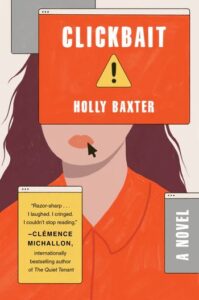There’s a phrase usually thrown round in journalism: “Don’t turn out to be the information.” In its easiest type, this aphorism is supposed to underscore the necessity for objectivity in a single’s reporting: Don’t insert your self into the story; keep the neutrality you owe your readers. Learn one other means, nevertheless, it turns into normal recommendation to a world obsessive about celeb and even notoriety. The pursuit of being newsworthy, it suggests, not often results in happiness. Whether or not you’re a trad spouse whose model went viral after which obtained painfully uncovered in a Occasions of London characteristic or the would-be murderer of a presidential candidate, if you end up compelled to motion by the imagined reactions of the broader public, then you definately’ve most likely set off down the unsuitable path.
Article continues after commercial
“Changing into the information” is a grimy enterprise—that a lot everybody can agree on. Even the individuals who flip themselves into manufacturers would slightly inform you they’re “residing their genuine lives” in public, not tailoring them to the algorithm. On Instagram and TikTok, we droop disbelief as we watch moneyed Utah wives make crayons from scratch for his or her completely manicured youngsters.
At political conventions, nobody breaks kayfabe as they speak about their salt-of-the-earth, soccer-coach, suburban life, by some means completely appropriate with a visit to DC each different week and an expense account that runs into the lots of of hundreds. Billionaires and Hollywood actors and enterprise capitalists are “simply so fortunate,” #blessed. They’re imagined to profess that they’re embarrassed in regards to the consideration they invited, or the general public will shortly activate them.
What I’ve realized—infuriatingly, to the folks on the high of the tree—is that readers are unpredictable.
“Clickbait” is the soiled phrase everybody’s avoiding. Nobody needs to be the disappointing morsel on the finish of the dangled line.
Again when newspapers had been primarily print and the digital evolution was merely a spot on the horizon, we used to speak about “making readers eat their greens.” What this meant was juxtaposing much less thrilling, however extra worthy, content material with the salacious stuff the lots had been presumed to need. The sordid particulars of a politician’s affair seem on the identical web page as a characteristic in regards to the economic system; the profile of the pop singer is positioned a number of pages behind the Center East correspondent’s dispatch from the Lebanese border; the sports activities pages are at all times, at all times on the finish. Readers needed to be cajoled into consuming high-brow content material, went the pondering. Push the broccoli rabe of the coverage announcement earlier than rewarding them with the strawberry soft-serve of this summer season’s vogue must-haves.
Lots of people lament the demise of the “consuming your greens” mannequin. Many consider that readers had been higher knowledgeable when a bodily paper was of their hand, compelling them to battle by way of that financial treatise earlier than touchdown on the film opinions. There’s no proof, after all, that that ever occurred; it’s simply as possible that readers who cared extra about movie than the economic system turned straight to the Tradition part as quickly as they purchased the paper.
However again then—earlier than viewers measurement know-how, earlier than web optimization evaluation, earlier than everybody contained in the publication may see with their very own eyes what number of readers consumed the life-style listicles versus what number of learn by way of 2,000 phrases of philosophizing—everybody may faux. And pretending meant that everybody obtained paid the identical, and everybody was seen as an equal a part of the machine.
Nowadays, it’s extra of a dog-eat-dog world. Contained in the newsroom, folks battle it out for reader share in actual time. It’s straightforward to painting this shift as a decline in journalism and to reminisce in regards to the good ol’ days once we had been all on equal footing. However to take action can be to disregard how deeply paternalistic the “eat your greens” technique was. As an alternative of caring what readers truly wished to learn, the “eat your greens” newspaper appointed a small group of often white, male editors and informed them to determine what the general public deserved to know. They then compiled a publication in their very own picture. Little marvel that something pertaining to the feminine perspective spent a very long time hidden behind a small “Girls’s” part. Little marvel that the one content material catered correctly to folks of coloration or members of the LGBT neighborhood ended up exterior of mainstream publications completely for many years.
Clickbait likes to consider itself because the egalitarian different to the paternalistic “eat your greens” technique. Brief tales promoting intercourse, demise and worry below the banner of a super-simplified, “look-at-me” headline are what folks really need, we’re informed, and dissent is snobbery. Such clickbait tales tailor content material round what readers are already expressing an curiosity in, in line with specialised algorithms, and feed it again to them in numerous guises. It seems to be very totally different to “eat your greens” however basically, it views readers in a really related means.
I began my profession in a linen closet on my finest pal’s flooring. We had been writing a weblog referred to as The Vagenda on the time, which we pitched to the broader public (nicely, our friendship group) because the antidote to more and more out-of-touch girls’s magazines. By day, I wrote press releases about technological improvements within the wholesale broadband house for a PR agency, which was about as scintillating because it sounds. By night time, I sat at my pal Rhiannon’s kitchen desk and we wrote satirical content material about Cosmopolitan journal earlier than I went to mattress below a blanket her grandma had knitted, my legs wrapped round her house’s massive, Victorian-era boiler. We prayed for fame and fortune.
And in our personal, small means, we obtained it. The Vagenda went viral; after simply 24 hours, we had 60,000 readers. The magazines we’d poked enjoyable at listened, and developed. Editors reached out to us. We each ended up getting correct jobs in journalism out of the eye, working for revered publications. We had been fortunate. We had been #blessed. We had been good at writing clickbait.
What do you study in a newsroom? Some folks study to not have an ego, others develop one. I’ve seen folks stroll round just like the farm’s chief cockerel as a result of their piece did 100,000 uniques on a Thursday morning. I’ve seen celebrities pull out of interviews as a result of somebody on the Opinion desk wrote an unflattering op-ed about them as soon as, they usually Googled it earlier than sitting down with a tradition author. I’ve seen tales about pansexual magnificence pageant winners promoting intercourse toys fail to rank, and 4,000-word options in regards to the Cambodian genocide do loopy numbers. What I’ve realized—infuriatingly, to the folks on the high of the tree—is that readers are unpredictable. Generally their basest instincts may be manipulated for cash, however different occasions they’re simply not .
I consider that the conceptual core of any answer is that we should always proceed in good religion once we think about our readers.
There may be an attention-grabbing dynamic in journalism in 2024. On the high of the tree are editors—individuals who, within the olden days, had paid their dues on the entrance strains after which settled in on the high—and people are the individuals who dictate the tales and write the headlines however whose bylines by no means adorn the pages. Then there are the reporters, who put their names to these tales and see the implications on social media. More and more, the editors will not be former reporters; they’re, as an alternative, both strategists or specialists in viewers measurement. As you possibly can think about, this method results in intra-office controversies. Reporters wish to protect their good title; editors wish to generate sufficient numbers on the viewers measurement chart that no person will get fired.
And but, these newsrooms are additionally extra numerous than they’ve ever been. Individuals like me—who grew up with no connections to talk of, whose mother and father didn’t have spectacular jobs in journalism or generational wealth — get to do issues we’d by no means have been capable of do earlier than (like, in my case, run a political staff throughout a normal election.) Individuals a lot much less privileged and extra spectacular than me get to jot down, edit and handle. Selections are made based mostly on information, slightly than vibes. We are able to speak all day about whether or not that information could or will not be evil—generally it undoubtedly is—however we are able to’t deny that having some impartial arbiter of what does nicely and who counts as a reader has pressured newspapers to turn out to be extra heterogeneous locations.
My debut novel, Clickbait—a title you certainly noticed coming—is about contained in the worst case situation of this setting: an aggregation-heavy tabloid that juices its workers after which discards them. Having labored in numerous newsrooms and for a variety of totally different publications over the last decade since we launched The Vagenda, I’ve seen the perfect and the worst of journalism, and I’d prefer to assume I can maintain a mirror as much as its least flattering face fairly nicely. In satirizing the issue, I’ve no complete, sensible answer: my novel isn’t a manifesto.
However I consider that the conceptual core of any answer is that we should always proceed in good religion once we think about our readers. Like how social media devolves into dogpiling and straw-manning once we select to learn others’ phrases of their most bad-faith incarnations, a newspaper shortly turns into a cesspit once we consider our readers to be fools and voyeurs. Nothing, however nothing, ever beats out considerate, unique content material.
You continue to want an attention grabbing headline, although.
__________________________________

Clickbait by Holly Baxter is on the market from Harper Perennial, an imprint of HarperCollins Publishers.

